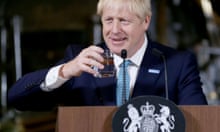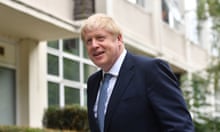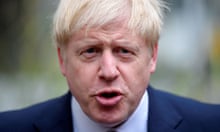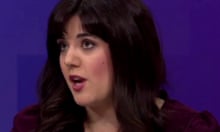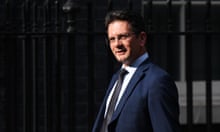Boris Johnson’s key allies have said his government will take a unifying approach that looks beyond Brexit, as Theresa May’s successor finalised plans for his first cabinet before his official arrival in Downing Street.
With Johnson due to go to Buckingham Palace for the formality of meeting the Queen in the early afternoon, leading backers among Conservative MPs sought to allay fears of a government dominated by a strongly leave-based agenda, to the exclusion of all else.
“Uniting the party, and through that then uniting the country, is a really important part of what Boris is talking about,” said Matt Hancock, the health secretary who backed Johnson after his own bid to succeed May foundered.
“Ultimately he is a progressive, one-nation, modernising Conservative. That’s how he describes himself, that’s why I support his agenda so strongly,” Hancock told BBC One’s Breakfast programme.
Quick GuideBoris Johnson's to-do list
Show
A cabinet reshuffle
The first task of any new PM involves rewarding some loyal allies and disappointing more. Several Johnson loyalists have had their eye on the post of chancellor, but only one can do it. A complete clearout of May’s remain-minded ministers provided plenty of opportunity to reward the Brexit believers though.
Brexit
The issue that will define a Johnson premiership. He has promised to rapidly renegotiate almost all of May’s departure deal, ditching the Irish backstop border guarantee policy – something that would seem a huge task over any timescale, let alone little more than 12 weeks, a fair proportion of which is taken up by a summer break. If this fails, he will be set on a no-deal departure for 31 October, and a likely huge clash with MPs.
Iran
If Brexit wasn’t enough, a new Johnson government must immediately take steps to make sure he doesn’t begin his time in No 10 with a slide into war. The situation in the gulf is complex, fast-moving and hugely dangerous. Johnson did not cover himself in glory as foreign secretary, especially over Iran. It will be his task to prove he has learned.
Managing parliament and Tory MPs
Johnson will start as PM with a working Commons majority of four, thanks to the DUP, but within weeks it is likely to be down to three if as expected the Liberal Democrats win in the Brecon and Radnorshire byelection. If this wasn’t tricky enough, a small but significant section of Tory MPs openly detest Johnson, and will not want to help him out - and with his cabinet sackings, the ‘Gaukward squad’ of former senior cabinet members set on blocking a no-deal Brexit swelled in ranks.
Loosening the purse strings
Such was the fiscal largesse on display from both Johnson and Jeremy Hunt during the hustings process that much as he will seek to kick any decisions towards an autumn budget, voters – especially Tory members – will be expecting both tax cuts and more spending on areas such as education and the police.
Everything non-Brexit
This might sound glib, but there is a lot to consider – during the three-plus years of Brexit introversion May’s government failed to properly grasp any of a series of long-term, pressing national problems: the crisis in social care; the future of the NHS; a climate emergency; the increasingly insecure future of work; a broken housing market; rampant poverty, including among many working people. This is a huge workload for any new administration.
Being prime ministerial
Critics might say this is Johnson’s single biggest challenge. The leadership process has shown that while he endlessly harked back to supposed successes as London mayor – an often ceremonial role with relatively few powers – Johnson was notably quieter about his period as foreign secretary.
Being prime minister is like the latter, to a factor of 10 – a never-ending succession of red boxes containing vital documents, of urgent briefings, of a whole system hanging on your decisions. Johnson has a tendency to ignore advice, pluck statistics out of the air and rely on sudden, cheap glibness. Curbing these long habits will be a daily struggle - his adopting the acronym 'Dude' in his victory speech shows just how hard it is for him.
Peter Walker Political correspondent
Hancock was also at pains to stress that Johnson did not want his premiership defined only by his success or failure in removing Britain from the EU on 31 October, saying the new government would also focus on domestic issues such as education, policing and social care.
Hancock is among the more moderate of Johnson’s supporters, and the decision of the new prime minister’s camp to send him out on the broadcast round ahead of his arrival at No 10 illustrates the more inclusive message it is seeking to portray, mindful of the Tories’ tiny Commons working majority of three.
However, the strong feelings exposed by Johnson’s clear victory over Jeremy Hunt in a vote of Conservative members was illustrated as Hancock’s first answer in the interview, filmed outside parliament, was drowned out by a protester shouting: “Boris Johnson, a liar and a charlatan.” There was widespread speculation over Hunt’s future, with some reports that he had turned down the post of defence secretary.
Johnson must also placate ardent Brexiters among his cabinet, who will expect a series of frontbench jobs, the first of which will be announced after he arrives at Downing Street from the palace at about 4pm to make the traditional address to the country.
Among these is Priti Patel, the former international development secretary who was forced to quit May’s government in disgrace in late 2017 for holding 14 unofficial meetings with Israeli ministers, businesspeople and a senior lobbyist while on holiday.
Some reports tip Patel to be made home secretary. Speaking to ITV’s Good Morning Britain, Patel also talked about the need for inclusivity, and for an agenda stretching beyond Brexit, but was notably more critical of May’s government.
“The important job now has to be getting on and doing the job of Brexit,” she said. “I think, actually, the country is just fed up now, sick and tired of this malaise that we have, this sort of indecision that has gripped the heart of Westminster.”
Patel said Johnson, whom she called “forensic” in his approach, could sort out Brexit despite the desperately tight timetable, adding: “There’s a different style and a different approach. We’ve had regressiveness for the last three years, where there’s been no decisions. We’ve been speaking and talking our country down.”
May is due to hold a valedictory prime minister’s questions at midday, before making a final address outside No 10 at about 2.20pm. She will then head to Buckingham Palace to formally resign, before travelling to her Maidenhead constituency. Johnson will arrive at the palace after May before heading to Downing Street.
There he must complete work on a new cabinet. Both Hancock and Patel said they had not been offered any posts, and had no idea what might happen.
“I know for a fact that he hasn’t made any commitments to people in terms of cabinet posts,” Hancock said. “He’ll be making the decision according to what he thinks is in the best interests of the country.”
Hancock said he had no idea about a reported impasse between Johnson and Hunt, with Hunt refusing to accept a demotion from foreign secretary to defence. “I honestly don’t know the inside track of all this speculation. I’m not prime minister, Boris is prime minister. I’m not forming a government.”
Patel said the new cabinet would not entirely comprise leave voices, saying: “Boris spoke very clearly during the leadership contest of having a modern Conservative party, with all the talents that represent all aspects of the Conservative party.
“I’ve no doubt that’s exactly what he’ll do in government, to deliver Brexit but actually take us beyond Brexit and to all the domestic issues your viewers are so focused on – education funding, more police officers on the streets.”


